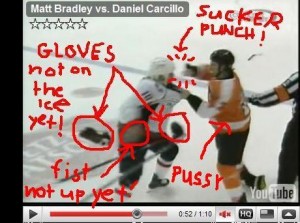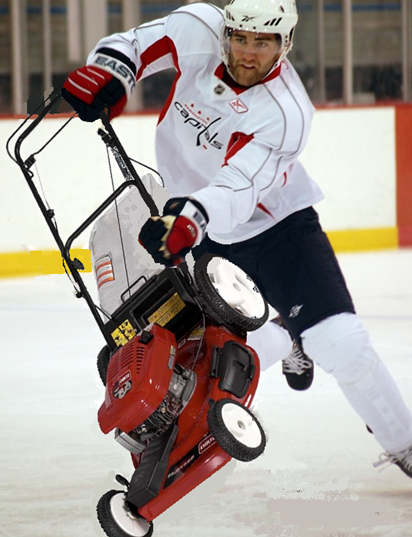The End of the Enforcer?
Upon recommendation last season, I read Ross Bernstein’s book The Code: The Unwritten Rules of Fighting and Retaliation in the NHL. Overall, it was an okay book. At times, Bernstein seems as if he is the first person to dare write about this. The Code, he says, is “a very taboo subject shrouded in mystery.” Is it? Is it really? (For what it’s worth, Bernstein has also written a nearly identical book about baseball’s “unwritten rules.”)
It should not come as a surprise to find out that fighting in hockey actually goes beyond haphazardly throwing one’s fists at the first opposing player who skates along. Many people may not realize the nuances behind what happens on the ice but when you think about it, there is a rather predictable pattern of behaviors and roles. It all becomes very clear when you know what to look for and it doesn’t take a lot to learn what to look for. I would not say The Code is any more a mystery than McDonald’s Big Mac secret sauce: most people don’t know exactly what it is–but it’s pretty easy to guess. It’s got something to do with Thousand Island Dressing. And The Code? Well, that has something to do with respect.
At least it used to, anyway. In short, the enforcer’s role is to protect the skill players on his team. He is an imposing presence on the ice, a warning to the other team that his players are off-limits. Fuck with them, he says, and you fuck with me. In the 80’s, Marty McSorley carried the nickname “Wayne Gretzky’s Bodyguard” and when Gretzky agreed to be traded from Edmonton to LA, bringing McSorley with him was one of his stipulations. That was how necessary having an enforcer was.
So one may wonder how such “sanctioned” fighting can have anything to do with respect because it surely seems unsportsmanlike. But there are key points: Enforcers should stick with fighting other enforcers. Both players must agree to fight and both fighters’ gloves should be off before punches are thrown. The fight should be started mutually, to avoid one player getting an instigator penalty as well as the fighting penalty. Don’t fight a player who is sick or injured. In fact, most players who decline fighting for those reasons are more than happy to re-schedule the fight for another day. Not adhering to the unspoken rules basically makes you look like an asshole and nobody, not even your teammates, likes an asshole.
But what good is an enforcer when respect is becoming more rare in the NHL? Is that because there are fewer enforcers or are there fewer enforcers because their presence is no long as important as it once was? Not only that, but the demand for skill players is growing higher and higher. With the salary cap and outrageous, multi-million, multi-year salaries, spending money on a player who will only play 4 minutes a game becomes a precarious proposition. For instance, in his entire 19 year NHL career, McSorley scored 118 goals in 1076 games. A good forward in today’s NHL will score a quarter of that during just one season. Which is more valuable? Protection or points?
Gretzky was 6 feet tall, 185 pounds compared to Alex Ovechkin’s 6’2″ height and 233 pounds. Thornton, Malkin, Marleau, Gaborik, Getzlaf, Heatley…most of the league’s top scorers thus far this season are of comparable size. Do they really need protection; are they imposing enough that players are less likely to take advantage of them? And if someone does really try to shut them down in a bad way, it’s most likely a cheap shot and there’s no respect there regardless of whether an enforcer is present. Enforcers are becoming less and less relevant in a league where respect toward other players appears to be dwindling. I firmly believe that when someone wants to be an asshole and take a cheap, completely illegal shot, they will do it no matter what. They aren’t afraid of retribution, so why pay someone for what is seemingly an irrelevant job when you can put that money into someone with tangible value?
This question has been raised in several places after the Av’s David Koci boarded Mike Green earlier this week. Would that have happened if the Washington Capitals had a designated enforcer as they used to, before they declined to renew Donald Brashear’s contract, or did Koci make a conscious decision to board Green without considering any consequence whatsoever?

And sure, Matt Bradley and John Erskine will step up to a fight if necessary but, um, Bradley hasn’t actually “won” a fight this season (via HockeyFights.com) and Erskine hasn’t fared much better. Not to mention that one of Bradley’s fights wasn’t really a fight, rather, a sucker punch. Please see my totally unbiased and extremely expertise depiction. Remember that lack of respect thing? Um, yeah.
Regardless of whether fighting helps balance respect or not, it still plays a vital role in the sport: it gets teams pumped up, it swings the momentum and gets the crowd fired up. To most people’s relief, fighting is not going away. It only remains to be seen whether the role of the enforcer will.
Oh, PS: I think the Caps are better using some of the Brashear money to get Knuble and Morrison, although a lot of that came from Kozlov and Federov’s departures too. And if the Capitals are looking for an enforcer on the cheap, may I recommend “Lawnmower” Joe Finley?
Amazing Photoshop by @danawalker


December 18th, 2009 at 1:24 pm
I picked up that book a few years ago and it has collected dust ever since. After seeing you werent crazy about it, it will probably just collect even more.
Anyway- I agree with you about fighting being enforcer Vs. enforcer. I hate seeing fighters/instigators trying to drop the gloves with someone they know wont fight or cant. (ie: Sean Avery constantly ignoring David Clarkson when Clarkson wants to go, but tries to get Zach Parise to go with him)
I dont know what it is with these guys lately, but I feel like they don’t really care if there is an enforcer that could come back and kick their butt if they hit someone. Look at the hit on Drury a few weeks back. They have Brashear on the bench, but whoever it was (it escapes me) that hit Drury clearly wasnt too concerned.
December 18th, 2009 at 1:51 pm
The book isn’t THAT bad…just ultra-repetitive. If you go through and just read the little stories from old skaters, that’s a lot better.
I think it was someone from Calgary on the Drury hit? I can’t remember either. But if Brash doesn’t deter someone, then probably nothing would! It’s the same thing with all the suspensions lately–that certainly isn’t deterring people either. I’d be more scared of Brashear than getting suspended though! I think you’re right; Avery has something out for Parise…it’s weird.
Thank you for commenting 🙂
December 20th, 2009 at 3:22 am
The importance of an enforcer is really dwindling, like you said, especially because of the salary cap and needing to spend money in more effective ways.
It was Curtis Glencross from Calgary with the Drury hit, and Glencross wasn’t concerned because he wouldn’t have answered the bell should Brash asked to dance anyway.
I just look at most fights these days and they lack the reverence or relevance they used to have. That, plus it’s a waste of money and roster space to dress a goon to play 4 minutes a game when most teams are becoming more and more skilled. I mean look at Philly for instance, they dress about 20 goons on a nightly basis and the Caps hang an 8 spot on them.
On Avery — he has a specific job. He’s not an enforcer by any stretch of the imagination (I’ve NEVER seen him stand up for himself, let alone his team mates) his purpose for being on the ice is yapping and getting into star players heads. Believe it or not, I think that’s a more effective use of roster space than an enforcer these days. He’s usually an underrated playmaker, whose skating is above average, and is usually good defensively, with the added bonus of annoying the hell out of the other team. I also think he’s a contributing factor as to why respect is nonexistent these days. Although as a former hockey player, I have to say, causing chaos in front of the net and mouthing off to opponents was always my M.O. as well.
I rambled way more than I meant to, sorry for taking over your comment section 🙂